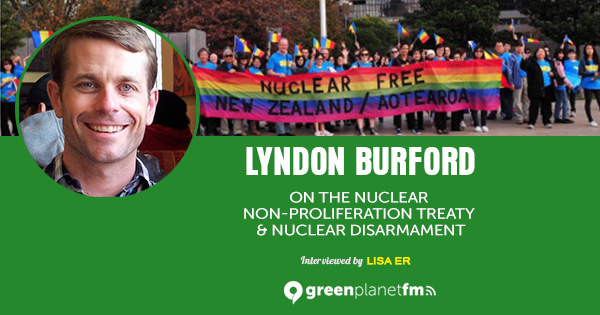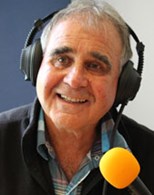
Over the past 45 years, the nuclear Non-Proliferation Treaty (NPT) has put in place an indispensable yet imperfect set of rules for creating a safer world.
Under the treaty, countries without nuclear weapons agree not to get them, and countries with nuclear weapons, (China, France, Russia, the UK and the US) agree to eventually get rid of them. India, Israel and Pakistan have nuclear weapons but have not joined the NPT; North Korea withdrew from the NPT in 2003, and then began testing nuclear weapons.
Meanwhile, nuclear armed countries are spending hundreds of billions of dollars on modernising their arsenals.
Between April 27 and May 22 2015, 160 countries met together in New York for the NPT’s five yearly review conference, hoping to further advance nuclear disarmament and stop the spread of nuclear weapons. Representatives of those 160 countries, including New Zealand, attended the conference, with observers from dozens of non-governmental organisations.
Lyndon Burford attended as a civil society adviser in the New Zealand delegation to the NPT Review Conference, and was also representing the Peace Foundation.
In this interview Lyndon explains how, after a month of negotiations, the conference failed to reach consensus on effective measures to advance nuclear disarmament or stop the spread of nuclear weapons.
To ensure the treaty remains relevant and effective, all countries need to provide leadership and take action to fulfil the treaty’s goals and aspirations. However the draft outcome document was not adopted at the end of the conference.
The content of the final draft was weak on disarmament, as was reflected in many delegates closing remarks, and the process to develop it was extremely problematic.
The discontent from most of the delegates, however, was most strongly about why the draft had been rejected. Three state parties, the US, Canada and Britain, blocked its adoption on behalf of Israel, a non-state party that possesses nuclear weapons! This was basically due to differences between Egypt and Israel on the process for convening a long-sought conference on a zone free of weapons of mass destruction in the Middle East.
This failure made it blatantly clear that Treaty’s implementation, and attempts to develop actions for moving forward, had not sufficiently shown the depth of the Treaty’s acceptance of privileging nuclear-armed states.
In response, three-quarters of all states at the 2015 conference argued that the catastrophic humanitarian consequences of nuclear weapons use shows the need to act with greater urgency to eliminate nuclear weapons dangers. The NPT’s five nuclear-weapon states insisted that the pursuit of disarmament must be step by step, which requires time and the right security conditions. For now, they argued, their security requires nuclear weapons.
The downturn in the US relations between Russia, and the US Chinese situation in the South China Sea now makes progress difficult.
Despite the outcome, a bright new prospect towards a world without nuclear weapons has emerged in the form of a Humanitarian Pledge, now endorsed by 107 states, which promises “to fill the legal gap for the prohibition and elimination of nuclear weapons”.
As the few states with nuclear weapons worked to complicate, and many critics say weaken, the NPT review process, more governments without nuclear weapons have endorsed the new pledge.
If the failure of the NPT Review Conference does not result in some new, meaningful disarmament commitment from the nuclear-armed states, then the signers of the Humanitarian Pledge will hopefully proceed toward a legal instrument that prohibits nuclear weapons.
Governments must find what South Africa called “moral courage” in order to begin a process to prohibit nuclear weapons. In so doing, they will be acting as part of a broader movement of governments and civil societies seeking to build a world that does not rely on violence as the currency of power, but rather on cooperation, peace, and justice.
Lyndon Burford is a PhD candidate in International Relations at the University of Auckland, studying Canadian and New Zealand nuclear disarmament diplomacy.
Lyndon has served on the Peace Foundation's International Affairs and Disarmament Committee since 2007, and has represented the New Zealand academic community since 2009 on the Study Group on Countering the Proliferation of WMD in the Asia-Pacific, a track-II initiative reporting to the ASEAN Regional Forum.
He was a civil society advisor on the New Zealand delegation to the 2015 NPT Review Conference.
In the interview Lyndon responds to many questions on nuclear war and its dangers, as well as speaking about the conference.
In the interview he recommends two web sites:
Don’t Bank on the Bomb - www.dontbankonthebomb.com
And International Campaign to Abolish Nuclear Weapons - ICAN - www.icanw.org
Lisa would also recommend that you view and share this 5 minute video from ICAN, and hear what the Red Cross says about the lack of humanitarian agencies and government department’s ability to launch an appropriate response to any nuclear situation:
www.icanw.org/multimedia/video/hope-and-horror
Other articles with more information on the NPT conference are:
www.armscontrol.org/ACT/2015_06/Focus/The-Disarmament-Deficit
www.reachingcriticalwill.org/disarmament-fora/npt/2015/nir/10049-final-edition-vol-13-no-17
and Lyndon’s article in the NZ Herald May 29 2015
www.nzherald.co.nz/opinion/news/article.cfm?c_id=466&objectid=11456274
This interview was sponsored by The Awareness Party – Politics with Principle.
------------------------------------
FYI
The Peace Foundation is hosting an international ""World Without War: Action for Peace"" conference on 19-20 September 2015 at Sir Paul Reeves Building, AUT Auckland.
This is being held during the Centenary of the First World War.
This event also aligns with the United Nations Assembly's resolution calling for a ‘Culture of Peace’ on 15 December 2014 with Peace action evidence outcomes. Past UNESCO President Federico Mayor has called for an implementation of the Programme of Action on a Culture of Peace, to stop the global ‘Crime of Silence’.
For more information go to http://action4peaceww100.co.nz
Calling all YOUTH ages 13-24 years old!
Here is your chance to participate at the 'World Without War: Action for Peace"" Conference.
We are giving away 100 FREE seats for youth to attend the two-day conference on 19-20 September.
We can only give away 2 seats per school or organisation, so hurry to avail of this limited opportunity.
Simply email [email protected]
Thank you to Global Future Charitable Trust for their generosity in sponsoring youth to the Conference.
